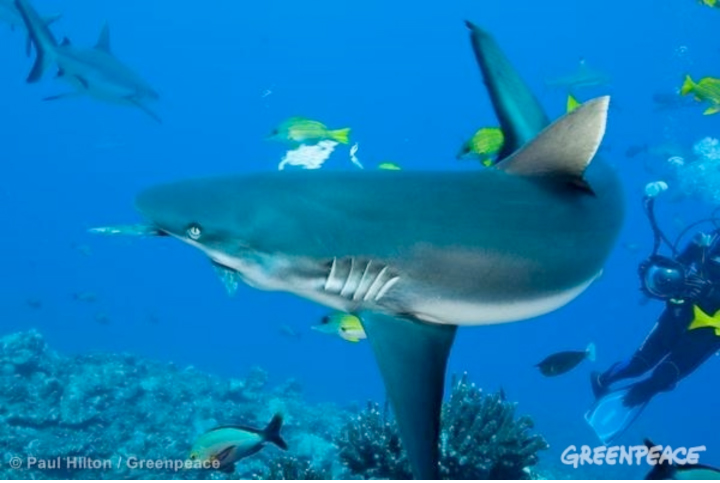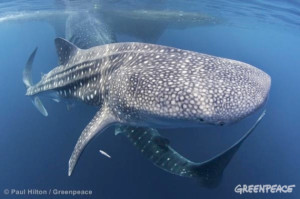Marine Life & Conservation
Is the tide turning in favour of sharks?

At the end of Shark Week, it’s time for some good news on sharks. Despite all the earlier blogs this week, this is not me trying to convince you sharks are huggable and loveable (though, they are, obviously), rather a round-up of some good conservation news for the world’s often-underappreciated shark species.
This year at the CITES (Convention on International Trade in Endangered Species) convention, countries agreed measures to limit the trade in a number of shark species. That means there is now greater control on several of the most threatened species: hammerheads, porbeagle, oceanic whitetips, as well as whale and basking sharks. Whilst this isn’t earth-shattering news, or full-blown protection it has been a hard-won victory to get any restrictions on the global trade in endangered sharks specifically (and fish in general!). So it’s great news for sharks that the global community seems to have turned a corner in agreeing that steps need to be taken. There is, of course, more to do…
And one of the most obvious things is to crack down on the horrendous practice of shark finning. Shark finning is when sharks are intentionally or ‘accidentally’ caught (often in the process of fishing for tuna), and just their fins are harvested. Sorry, ‘harvested’ sounds quite reasonable. Finning a shark is frankly no different than shooting a rhino or an elephant to hack off its horns or tusks … and the market is similarly for an entirely pointless and unnecessary product. Shark fin soup has celebratory status as a dish, but by all accounts is rather tasteless, in both senses of the word.
The good news on shark finning is that public perception is turning here too. The European Union recently agreed a ban on shark finning, meaning sharks, if caught, have to be landed with fins intact. That might not be enough for some of you, but it’s a huge step in stamping out the finning business. There is more to do here of course, especially on the issue of demand for shark fin soup. So it’s encouraging to see New York become the third US state to ban the sale of shark fins. Some haulage companies are turning away shark fin as a cargo too. This is sending a powerful message, that finning is increasingly unacceptable, but there is a long way to go. That’s why our colleagues in New Zealand for example are campaigning hard right now to get their country to be next on the list to consign shark finning to history.
These steps forward in regulating the trade of sharks is happening hand-in-hand with a growing awareness of sharks, and their place in the ecosystem. Around the world, previously feared or persecuted shark populations have become tourist attractions. Great whites provide a powerful spectacle off South Africa, whilst the sunny (no, really) isles of the Scottish Hebrides are one of the best places in the world to get up close with giant basking sharks. Whale sharks draw the tourists in the Philippines and Gulf of Mexico, whilst the waters of the Maldives offer up spectacular manta rays. Coral reefs in the tropics support an array of life, of course, but sharks are undoubted crowd-pleasers there too. Of course, these need to be developed carefully and considerately, as with all eco-tourism ventures, to have the minimum impact possible on the star turns.
 As sharks are being increasingly valued alive, some governments are seizing the opportunity to invest in them. That’s where marine reserves come in. Some shark species may be oceanic wanderers, but many have preferred feeding or breeding grounds that can be protected. Where sharks are protected, such as in the Chagos Archipelago, or seas around Fiji, the effects are plain to see – with scientists recording thriving shark populations in these oceanic sanctuaries.
As sharks are being increasingly valued alive, some governments are seizing the opportunity to invest in them. That’s where marine reserves come in. Some shark species may be oceanic wanderers, but many have preferred feeding or breeding grounds that can be protected. Where sharks are protected, such as in the Chagos Archipelago, or seas around Fiji, the effects are plain to see – with scientists recording thriving shark populations in these oceanic sanctuaries.
The future for sharks could be bright, but we need to do much more to help redress the balance of what we have done, and are still doing to them. If Shark Week has one take home message – it should be that.
Willie Mackenzie is an Oceans Campaigner at Greenpeace UK.
http://www.greenpeace.org/international/en/news/Blogs/makingwaves/shark-week/blog/46187/
Blogs
The Ocean Cleanup Breaks 10,000,000 KG Barrier

The Ocean Cleanup, the global non-profit project, has removed a verified all-time total of ten million kilograms (22 million lbs.) of trash from oceans and rivers around the world – approximately the same weight as the Eiffel Tower.
To complete its mission of ridding the oceans of plastic, The Ocean Cleanup uses a dual strategy: cleaning up the Great Pacific Garbage Patch (GPGP) to remove the plastic already afloat in the oceans, while stopping the flow of plastic from the world’s most polluting rivers.
Through cleaning operations in the GPGP and in rivers in eight countries, the cumulative total of trash removed has now surpassed ten million kilograms. This milestone demonstrates the acceleration of The Ocean Cleanup’s impact, while underlining the astonishing scale of the plastic pollution problem and the need for continued support and action.
While encouraging for the mission, this milestone is only a staging point: millions more tons of plastic still pollute our oceans and The Ocean Cleanup intends to continue learning, improving and innovating to solve this global catastrophe.
This announcement comes as governments from around the world meet to continue negotiations to develop a new legally binding instrument to end plastic pollution at INC4 in Ottawa, Canada. Representatives of The Ocean Cleanup will be in attendance and the organization will be urging decision-makers to collaborate towards a comprehensive and ambitious global treaty which addresses plastic at all stages of its life cycle and in all marine environments worldwide, including in areas beyond national jurisdiction.
It is encouraging to see that the need for remediation is reflected in the various options for potential treaty provisions. It is essential that the final treaty contains clear targets for the remediation of legacy plastic pollution, and reduction of riverine plastic emissions.
Tackling plastic pollution requires innovative and impactful solutions. The treaty should therefore incentivize the innovation ecosystem by fostering innovations that make maximal use of data, technology and scientific knowledge – such as those designed and deployed by The Ocean Cleanup.
‘After many tough years of trial and error, it’s amazing to see our work is starting to pay off – and I am proud of the team who has brought us to this point.’ said Boyan Slat, Founder and CEO of The Ocean Cleanup. ‘While we still have a long way to go, our recent successes fill us with renewed confidence that the oceans can be cleaned.’
The Ocean Cleanup was founded in 2013 and captured its first plastic in 2019, with the first confirmed catch in the GPGP coming soon after the deployment of Interceptor 001 in Jakarta, Indonesia. After surpassing one million kilograms of trash removed in early 2022, the non-profit project has since progressed to the third iteration of its GPGP cleaning solution, known as System 03, and a network of Interceptors currently covering rivers in eight countries, with more deployments set for 2024.
About The Ocean Cleanup
The Ocean Cleanup is an international non-profit organization that develops and scales technologies to rid the world’s oceans of plastic. They aim to achieve this goal through a dual strategy: stemming the inflow via rivers and cleaning up the legacy plastic that has already accumulated in the ocean. For the latter, The Ocean Cleanup develops large-scale systems to efficiently concentrate the plastic for periodic removal. This plastic is tracked and traced through DNV’s chain of custody model to certify claims of origin when recycling it into new products. To curb the tide via rivers, The Ocean Cleanup has developed Interceptor™ solutions to halt and extract riverine plastic before it reaches the ocean. Founded in 2013 by Boyan Slat, The Ocean Cleanup now employs a broadly multi-disciplined team of approximately 140. The foundation is headquartered in Rotterdam, the Netherlands.
For more information, visit: theoceancleanup.com and follow @theoceancleanup on social media.
Marine Life & Conservation
Steve Backshall to headline Shark Trust’s flagship event: For the Love of Sharks

Join a host of amazing, shark loving, speakers including Steve Backshall and the Shark Trust team for an evening celebrating shark conservation at the Royal Geographical Society in London this November.
Date: 29th November 2024
Time: 6-10pm
Location: Royal Geographical Society, London
Tickets: https://www.sharktrust.org/Event/flos24
The event will be a celebration of all things shark. Those lucky enough to get hold of tickets will hear from engaging guest speakers with a passion for sharks.
The line-up includes (*subject to change if unforeseen circumstances arise)
Steve Backshall: One of television’s busiest presenters, BAFTA award-winning wildlife expert Steve has been passionate about the wild world ever since he was young.
Steve’s impressive TV career has taken him all around the world, investigating a wide array of species and environments. Steve has filmed over 100 hours of children’s wildlife programmes with the BAFTA award winning Deadly 60 franchise and recently, with Sky Nature, for his new series ‘Whale with Steve Backshall’. He has been a patron for the Shark Trust for 10 years.
Simon Rogerson: is a photojournalist specialising in natural history, diving and the sea.
He is editor of SCUBA magazine, the official journal of the British Sub-Aqua Club. Simon started his career as a crime reporter but gravitated towards his ‘less depressing’ interest in underwater exploration, joining the staff of DIVE magazine in 1999. In 2005 he was named ‘Editor of the Year’ in the PPA’s Independent Publishing Awards. Simon also works as a freelance writer, contributing frequently to the Sunday Times and Telegraph, in addition to BBC Wildlife, Esquire, and a host of international diving magazines. He is the author of a book, Dive Red Sea, published by Ultimate Sports. Now based in Berkshire, Simon has been a Patron of the Shark Trust for 20 years.
More speakers to be announced soon. Head to the Shark Trust website to learn more.
The evening will also allow guests the final chance to see the Oceanic 31, shark art exhibition. Some of the artwork will be auctioned/raffled at the event, while the rest will be auctioned online to raise money for the Shark Trust Oceanic Programme.
For the Love of Sharks is an evening with something for everyone who is interested and fascinated by sharks. Join the Shark Trust, their Patrons, Trustees and Staff, along with a host of supporters for this celebration of shark conservation.
For more information or to buy a ticket: https://www.sharktrust.org/Event/flos24
-

 News3 months ago
News3 months agoHone your underwater photography skills with Alphamarine Photography at Red Sea Diving Safari in March
-

 News3 months ago
News3 months agoCapturing Critters in Lembeh Underwater Photography Workshop 2024: Event Roundup
-

 Marine Life & Conservation Blogs3 months ago
Marine Life & Conservation Blogs3 months agoCreature Feature: Swell Sharks
-

 Blogs2 months ago
Blogs2 months agoMurex Resorts: Passport to Paradise!
-

 Blogs2 months ago
Blogs2 months agoDiver Discovering Whale Skeletons Beneath Ice Judged World’s Best Underwater Photograph
-

 Gear Reviews3 weeks ago
Gear Reviews3 weeks agoGEAR REVIEW – Revolutionising Diving Comfort: The Sharkskin T2 Chillproof Suit
-

 Gear Reviews3 months ago
Gear Reviews3 months agoGear Review: Oceanic+ Dive Housing for iPhone
-

 Marine Life & Conservation2 months ago
Marine Life & Conservation2 months agoSave the Manatee Club launches brand new webcams at Silver Springs State Park, Florida

















